If you're a DIY mechanic, having a reliable multimeter is a must. The top picks for 2024 include the AstroAI Digital Multimeter, known for its clear display and quick readings, and the KAIWEETS model that comes with safety features and a case. The TM-510 offers smart auto mode for ease, while the Klein Tools MM325 provides durability and accuracy. Finally, the KAIWEETS TRMS boasts a high-resolution display. Each of these tools is designed to enhance your electrical troubleshooting skills, making car maintenance smoother. Stick around to discover more about their features and advantages!
AstroAI Digital Multimeter Tester (2000 Counts)
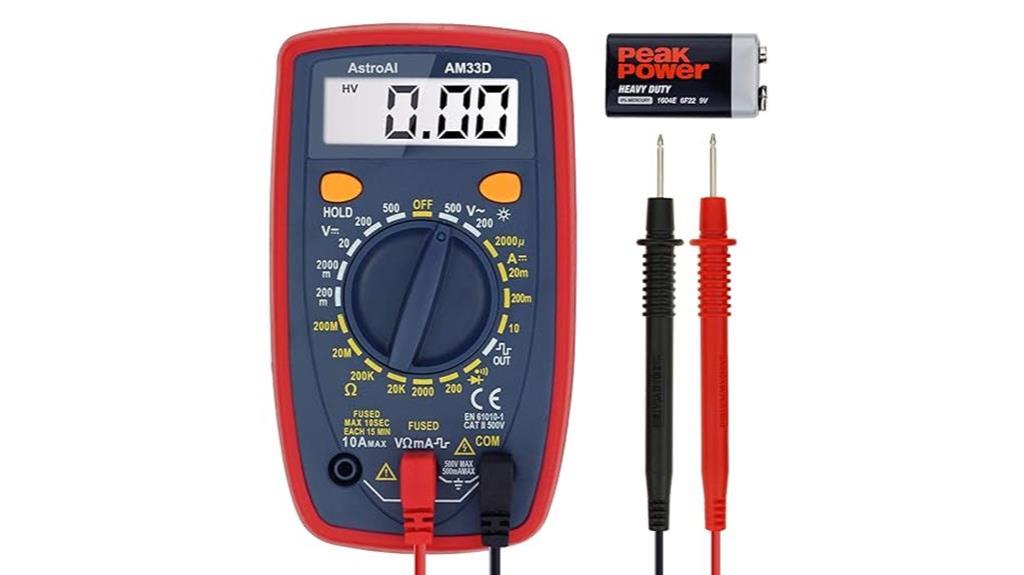
If you're a DIY enthusiast or a professional mechanic looking for a reliable tool, the AstroAI Digital Multimeter Tester (2000 Counts) stands out as a top choice for automotive diagnostics in 2024. This multimeter measures AC/DC voltage, DC current, resistance, and diode functionality, making it incredibly versatile. With a sampling speed of two times per second, you'll get accurate readings quickly. The large backlit LCD display is easy to read, even in dim conditions, and the continuity buzzer is a handy feature for quick checks. Despite its plastic construction, it's durable and lightweight, perfect for storage. Users rave about its effectiveness for both automotive repairs and household tasks, making it a solid investment for anyone's toolbox.
Best For: The AstroAI Digital Multimeter Tester is best for DIY enthusiasts and professional mechanics seeking a reliable tool for automotive and household electrical diagnostics.
Pros:
- Versatile functionality: Measures AC/DC voltage, DC current, resistance, and diode, making it suitable for a variety of tasks.
- User-friendly design: Features a large backlit LCD display and intuitive layout, enhancing visibility and ease of use.
- Good value for money: Combines essential features typically found in higher-end models at a lower price point.
Cons:
- Plastic construction: While durable, the plastic build may feel cheaper compared to metal counterparts.
- Lead wire connections: Some users have reported minor concerns about the quality of the lead wire connections.
- Limited sampling speed: At two times per second, the sampling speed may be slower than some more advanced multimeters.
KAIWEETS Digital Multimeter with Case for Household and Automotive Testing
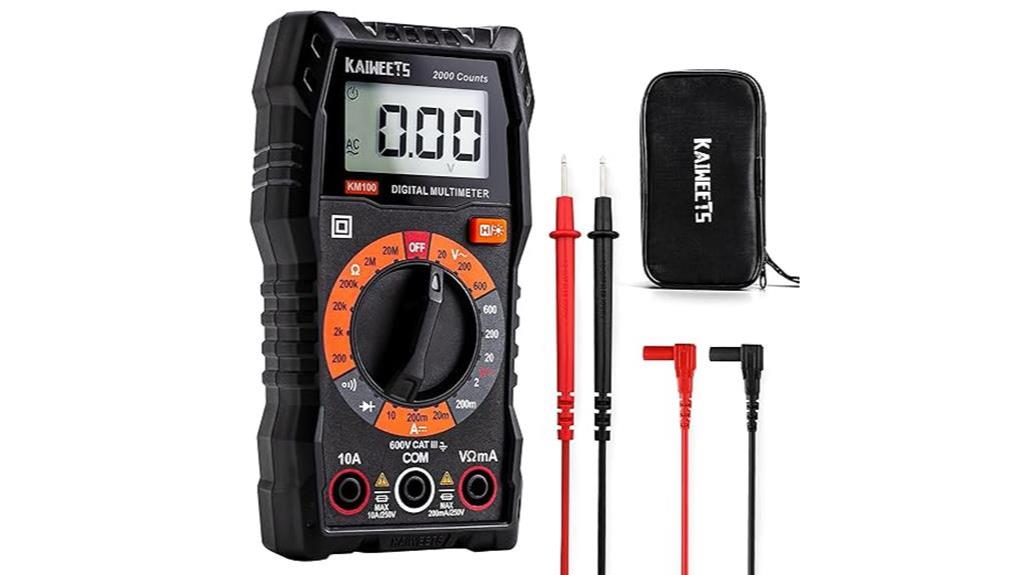
The KAIWEETS Digital Multimeter is an ideal choice for anyone needing a reliable tool for household and automotive testing. With functions like AC/DC voltage, resistance, and continuity testing, it's versatile enough for various electrical tasks. I appreciate its safety features, including CAT III 600V rating and overload protection, which give me confidence during use. The included carrying case and pre-installed batteries make it incredibly convenient. I find the data hold and backlight functions especially useful for working in dim conditions. Plus, KAIWEETS offers lifetime technical support, so I know I can get help if needed. While it may not feel as durable as some higher-end brands, it provides excellent value for DIYers and hobbyists alike.
Best For: DIYers and hobbyists looking for a reliable, cost-effective multimeter for household and automotive electrical testing.
Pros:
- User-friendly design with clear display and intuitive controls.
- Safety features including CAT III 600V rating and overload protection.
- Includes carrying case and pre-installed batteries for convenience.
Cons:
- May feel less durable compared to higher-end brands.
- Limited to DC current testing; not suitable for AC current.
- Some users may find it less effective for professional-grade tasks.
TM-510 Digital Multimeter with Smart Measurement
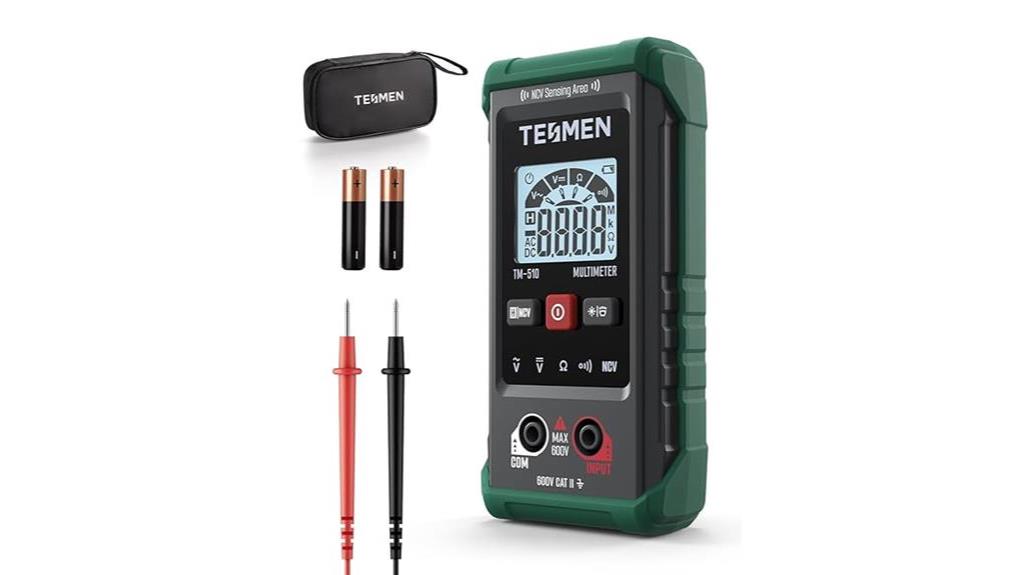
For anyone looking to simplify their automotive electrical troubleshooting, the TM-510 Digital Multimeter with Smart Measurement stands out as a top choice in 2024. With its smart auto mode, switching between voltage, resistance, and continuity tests is a breeze, making it perfect for beginners and experienced users alike. I love its auto-ranging feature, which automatically selects the correct measurement range, eliminating guesswork. The non-contact voltage test adds a layer of safety, with visual and audible alerts to guarantee I'm working safely. Built to last, the TM-510 comes with a durable silicone cover and overload protection. At around $20, it's a fantastic investment for anyone needing a reliable, user-friendly multimeter for automotive tasks.
Best For: The TM-510 Digital Multimeter is best for households, amateur technicians, and DIY enthusiasts seeking a reliable and user-friendly tool for electrical measurements.
Pros:
- Smart Auto Mode simplifies switching between measurement tasks, making it ideal for both beginners and experienced users.
- Auto-ranging feature eliminates guesswork by automatically selecting the appropriate measurement range.
- Durable silicone cover and overload protection enhance safety and longevity of the multimeter.
Cons:
- May lack advanced features needed by professional electricians or highly specialized tasks.
- The compact design might feel small for users with larger hands during extended use.
- Limited measurement counts (4000 counts) compared to higher-end models may restrict precision for more technical applications.
Klein Tools MM325 Digital Multimeter
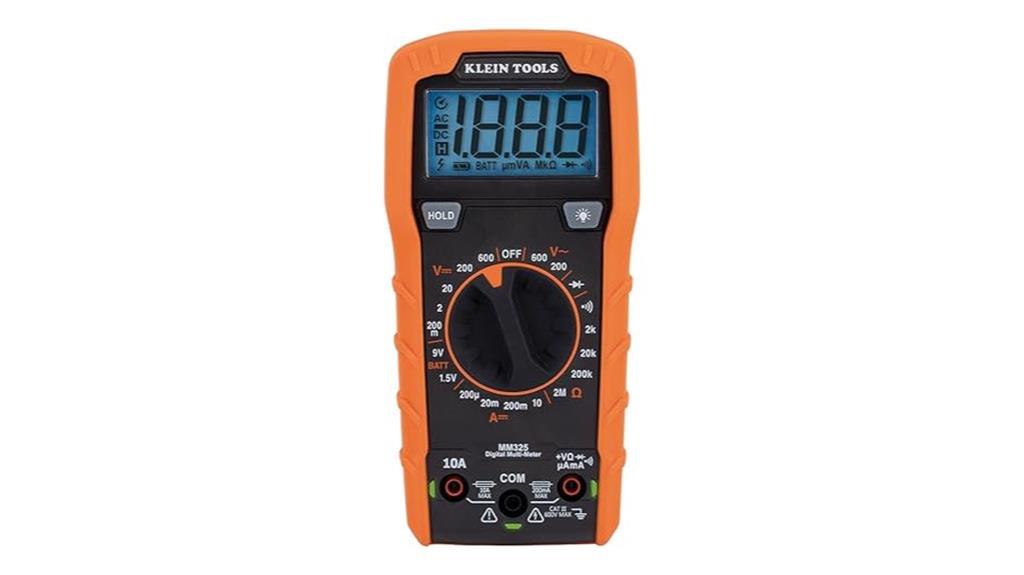
Offering a manual-ranging design, the Klein Tools MM325 Digital Multimeter is perfect for car enthusiasts and DIY mechanics who need precise electrical measurements. It measures AC/DC voltage up to 600V, 10A DC current, and 2MΩ resistance, making it versatile for various tasks. I appreciate its backlit LCD display, which guarantees visibility even in low-light conditions. The lead-alert protection with LEDs helps me confirm proper test lead placement, enhancing safety and accuracy. Plus, its rugged design withstands drops from 6.6 feet, proving its durability. Users rave about its reliability and functionality, especially for tasks like checking vehicle fuses. While it lacks a carrying case, the Klein Tools MM325 remains a solid choice for anyone seeking a quality multimeter without breaking the bank.
Best For: The Klein Tools MM325 Digital Multimeter is best for car enthusiasts and DIY mechanics seeking a reliable and affordable tool for precise electrical measurements.
Pros:
- Versatile functionality for measuring AC/DC voltage, current, and resistance.
- Durable design that can withstand drops from 6.6 feet, ensuring longevity.
- Backlit LCD display for easy reading in low-light conditions.
Cons:
- Lacks a carrying case, which may inconvenience some users.
- Manual-ranging design may be less convenient for those who prefer auto-ranging multimeters.
- Optional accessories like sharp pointed leads and magnetic straps can be considered pricey.
KAIWEETS Digital Multimeter TRMS 6000 Counts
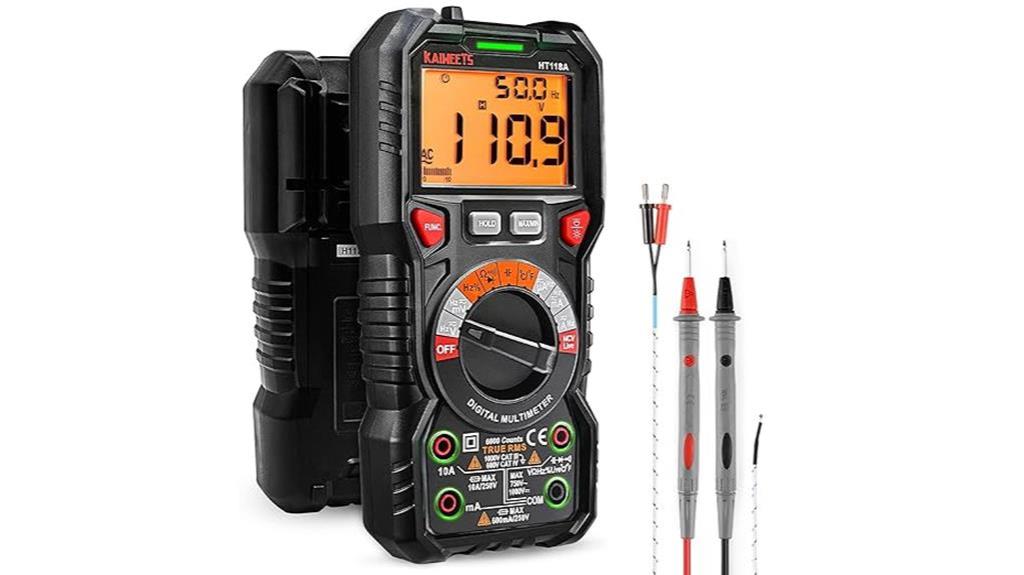
With a remarkable 6000 counts resolution, KAIWEETS Digital Multimeter TRMS 6000 Counts stands out as an excellent choice for both hobbyists and light commercial users looking to tackle automotive electrical issues. It measures up to 600V AC/DC voltage and 10A current, making it versatile for various tasks. The auto-ranging feature and large 2.9" LCD backlight display enhance usability, especially in low-light conditions.
Safety is a priority, as it's IEC Rated CAT III 1000V and CAT IV 600V, ensuring reliable protection. Users appreciate its affordability, typically around $40, while still delivering decent accuracy. Although some features are missing, like the Relative button, it's overall a solid tool for DIY mechanics, backed by a 36-month warranty.
Best For: Hobbyists and light commercial users seeking an affordable and versatile multimeter for automotive electrical tasks.
Pros:
- High-resolution 6000 counts display for accurate readings.
- Non-contact voltage testing with visual and auditory alerts.
- Durable design with protective silicone case and safety certifications.
Cons:
- Lacks features like a Relative button and manual range selection.
- Some users reported initial quality issues with used units.
- Slow resistance readings may be a concern for certain applications.
Factors to Consider When Choosing Multimeters for Cars
When choosing a multimeter for your car, you'll want to take into account factors like measurement range accuracy and safety ratings to guarantee you get reliable results. User-friendly features and build quality also matter, as they can enhance your overall experience. Finally, think about functionality and versatility to make certain the multimeter meets all your automotive needs.
Measurement Range Accuracy
How do you guarantee you're picking the right multimeter for automotive tasks? Start by considering the measurement range. For AC/DC voltage, choose a multimeter that covers at least 600V. This range guarantees you can handle car battery systems and various electrical components without a hitch.
Next, look for a multimeter with a minimum of 10A DC current capability. This feature is essential for accurately measuring current draw from automotive circuits without risking damage to the device.
Resistance measurement also plays an important role; opt for a multimeter that measures up to 20 MΩ or higher. This capability allows you to accurately test automotive sensors and wiring, guaranteeing peak performance.
Don't overlook the importance of True RMS capability. It provides precise readings for both AC and DC currents, especially with fluctuating signals found in vehicles.
Lastly, consider a multimeter with auto-ranging features. This functionality simplifies your measurements by automatically adjusting to the correct range, enhancing your efficiency during diagnostics. By focusing on these aspects, you'll guarantee your multimeter accurately meets the demands of automotive tasks.
Safety Ratings Importance
Choosing the right multimeter for automotive tasks goes beyond just measurement capabilities; safety ratings play a essential role in ensuring your protection during use. Look for multimeters with IEC ratings, like CAT III or CAT IV, which indicate their electrical safety level. These ratings are critical for protecting you from electric shock when testing various automotive systems.
Consider devices that feature double fuses and overload protection. These enhancements help prevent damage to the multimeter and reduce the risk of electrical hazards. Multimeters certified for higher voltage ratings, such as CAT III 600V, are particularly suited for automotive applications, where you might encounter various voltage levels.
Additionally, a silicone protective case can greatly boost safety by cushioning the device from drops and minimizing accidental contact with live wires. Continuous safety features, like non-contact voltage testing, allow you to detect live wires without direct contact, further reducing the risk of electrocution. By prioritizing safety ratings and features when choosing your multimeter, you're not just investing in a tool; you're safeguarding your health while working on automotive tasks.
User-Friendly Features
While selecting a multimeter for automotive use, it's crucial to prioritize user-friendly features that enhance your testing experience. First, look for models with backlit LCD displays, which guarantee visibility in low-light conditions—perfect for those tricky spots under dashboards or in engine compartments.
Auto-ranging capabilities are another key feature to take into account. They simplify the process of measuring different electrical parameters without the hassle of manually setting the range, making it a breeze for beginners. Additionally, a continuity buzzer can provide audible feedback during tests, allowing you to quickly identify circuit connectivity without constantly checking the display.
Data hold functions are also beneficial, as they let you freeze readings on the display, making it easier to record or reference critical information during diagnostics. Finally, verify the multimeter has a user-friendly design, with clearly labeled buttons and functions. This not only simplifies operation but also reduces the likelihood of user error during your tests. By focusing on these user-friendly features, you'll make your automotive troubleshooting more efficient and effective.
Build Quality Durability
When it comes to selecting a multimeter for automotive use, build quality and durability are paramount. You want a model that can handle the rigors of working in tight spaces and withstand potential drops. Look for multimeters with durable construction, such as silicone covers or reinforced casings. These features can protect against impacts and keep your tool in top shape.
Safety is another essential factor, so verify the multimeter meets safety certifications, like CAT ratings. These ratings indicate the device's ability to handle high voltages while minimizing your risk of electric shock. Additionally, opt for models with double ceramic fuses that provide overload protection and enhance longevity.
Weight matters too; a lightweight yet sturdy design makes it easier for you to maneuver in cramped automotive environments without sacrificing reliability. Finally, consider usability features like a backlit display and ergonomic design. These will make your long testing sessions much more comfortable and efficient. Investing in a well-built multimeter means fewer replacements and more reliable readings, making it a wise choice for any DIY mechanic.
Functionality Versatility
A high-quality multimeter not only needs to be durable but also versatile for various automotive tasks. When choosing a multimeter, you should verify it can measure both AC and DC voltage, ideally with a range of at least 600 volts. This capability is essential for diagnosing different automotive electrical systems.
Resistance measurement is another important feature; a multimeter that can measure up to 60 MΩ allows you to test components like sensors and wiring accurately. Additionally, continuity testing is critical for verifying electrical connections, often signaled by an audible beep, which saves you time during diagnostics.
Look for auto-ranging features, as they simplify the measurement process by allowing you to switch between different ranges without manual adjustments. This can be particularly helpful when you're in a hurry or working in tight spaces.
Consider extra functions such as temperature measurement and diode testing, as they enhance the versatility of your multimeter. These additional capabilities make it suitable for a broader range of automotive diagnostics, guaranteeing you have a reliable tool for any situation that arises.
Price Versus Performance
Finding the right balance between price and performance is crucial when choosing a multimeter for automotive use. You'll want to take into account key features like AC/DC voltage measurement, resistance testing, and continuity functions, as these are critical for diagnosing electrical issues in your car. While budget-friendly multimeters might handle basic tasks, investing in a mid-range model can greatly enhance accuracy and durability, especially if you frequently work on vehicles.
Higher-priced multimeters often offer advanced functionalities, such as True RMS measurements and non-contact voltage testing, which can improve your diagnostic capabilities. Additionally, look for multimeters with higher count ratings—models with 6000 counts provide better resolution and precision compared to those with only 2000 counts.
Don't forget about warranty and after-sale service. A multimeter with a solid warranty and responsive customer support can protect your investment and guarantee reliable performance over time. Ultimately, you'll want to choose a multimeter that meets your needs without breaking the bank, balancing essential features with long-term value for a successful DIY mechanic experience.
Frequently Asked Questions
Can I Use a Multimeter for Testing Battery Health?
Yes, you can use a multimeter to test battery health. Start by setting the multimeter to the DC voltage setting. Then, connect the red probe to the positive terminal and the black probe to the negative terminal of the battery. A healthy battery should read around 12.6 volts or higher when fully charged. If it's considerably lower, your battery might be weak or need replacement. Regular testing helps keep your vehicle's electrical system in check.
How Often Should I Calibrate My Multimeter?
So, you think you can just set your multimeter and forget it like last week's leftovers? Think again! Ideally, you should calibrate your multimeter at least once a year, or more often if you're using it for critical measurements. If it's been dropped or exposed to extreme conditions, recalibrate it immediately. Keeping it accurate guarantees you won't accidentally wire your car's battery wrong—unless you're aiming for an electrifying surprise!
Are Multimeters Waterproof or Water-Resistant?
Multimeters aren't typically waterproof, but many are water-resistant to varying degrees. If you're working in a humid or wet environment, check the specifications of your multimeter for its IP rating. An IP rating of at least 54 indicates good protection against water splashes. Remember, just because a multimeter is water-resistant doesn't mean it's safe for prolonged exposure to liquids. Always handle your equipment carefully to guarantee its longevity and accuracy.
What Safety Features Should a Car Multimeter Have?
When you're diving into the world of car diagnostics, safety features in a multimeter are your lifebuoy. Look for overload protection to prevent damage during high voltage tests, and guarantee it has a fused input to safeguard against short circuits. A durable casing and insulated probes can add an extra layer of protection. Additionally, consider a multimeter with a backlit display for clarity in low-light conditions, ensuring you work safely and efficiently.
Can I Use a Multimeter for AC Voltage Testing?
Yes, you can use a multimeter for AC voltage testing. Just make certain your multimeter has the AC voltage setting. To test, set the dial to the appropriate AC voltage range, then connect the probes to the circuit. You'll get a reading that indicates the voltage present. Always verify you're following safety precautions, especially when working with live circuits. It's crucial to know your multimeter's limits to avoid damage or injury.
Wrapping Up
In the world of DIY car maintenance, a reliable multimeter is like having an extra set of hands. Whether you're testing batteries or diagnosing electrical issues, the right tool makes all the difference. The five multimeters we've highlighted in 2024 offer a range of features to suit every need and budget. So, gear up and take charge of your vehicle's health with one of these essential tools—you'll be amazed at what you can achieve!
Ben Wilkinson is a an experienced mechanic with over 10 years of experience in the automotive repair industry. He is highly skilled in diagnosing and repairing a wide range of car-related issues, from basic maintenance tasks to more complex repairs.

